新人教版九年级英语unit9单词讲解解析
人教版九年级英语unit 9单元知识点

人教版九年级英语unit 9单元知识点Unit 9 Knowledge Points in Grade 9 EnglishIntroduction:In the ninth grade English curriculum, Unit 9 covers important topics related to transportation and travel. This unit equips students with useful vocabulary, sentence structures, and grammar concepts to communicate effectively in various travel scenarios. Let's delve into some key knowledge points from Unit 9.1. Vocabulary:Expanding one's vocabulary is crucial for effective communication. Unit 9 introduces a range of travel-related words and phrases such as "commute," "boarding pass," and "lost luggage." Additionally, it emphasizes adjectives to describe transportation, such as "convenient," "comfortable," and "reliable." Learning these words will enhance students' ability to talk about different modes of transportation and travel experiences.2. Sentence Patterns:Unit 9 focuses on sentence patterns commonly used in travel situations. For instance, students learn to express the purpose of theirtravel using the sentence structure "I'm going to + place + to + verb." They also practice asking and giving directions using the "Can you tell me how to + verb" or "Go down + street name + and turn + direction" patterns. Mastering these patterns helps students engage confidently in conversations related to travel.3. Grammar Concepts:Unit 9 introduces two important grammar concepts: the future continuous tense and the passive voice. The future continuous tense is used to describe an ongoing action that will happen in the future. For example, "Next month, I will be traveling to Europe." Students also learn how to form passive sentences, which are useful when discussing transportation services, such as "Buses are often used for public transportation." Understanding and practicing these grammar concepts enhances students' ability to express themselves accurately and appropriately.4. Listening Skills:Listening comprehension is vital for effective communication. Unit 9 provides students with listening exercises that focus on travel-related conversations, such as buying tickets or asking for travel advice. By practicing listening skills, students not only improve their ability tounderstand spoken English but also learn essential travel-related phrases and expressions.5. Speaking Activities:Unit 9 encourages students to engage in various speaking activities to build confidence in expressing themselves orally. For instance, they can participate in role-plays simulating different travel scenarios like checking into a hotel or buying train tickets. These activities enhance communicative competence and help students apply the vocabulary, sentence patterns, and grammar concepts they have learned.6. Reading Comprehension:Unit 9 includes reading passages that provide students with exposure to different types of travel-related texts. These passages range from advertisements for travel agencies to travel blogs describing personal experiences. Reading comprehension activities enable students to improve their reading skills while gaining knowledge about travel destinations and cultural aspects.Conclusion:Unit 9 in the Grade 9 English curriculum offers essential knowledge points to enhance students' understanding and proficiency in travel-related English communication. From expanding vocabulary to mastering grammar concepts and engaging in various activities, students develop the necessary skills to navigate travel situations confidently. By incorporating listening, speaking, and reading comprehension exercises, this unit ensures a comprehensive approach to language acquisition. Through effective learning strategies and practice, students can embark on their own English language journey, exploring the world one conversation at a time.。
人教版(新目标)初中英语九年级下册Unit 9 自学知识点
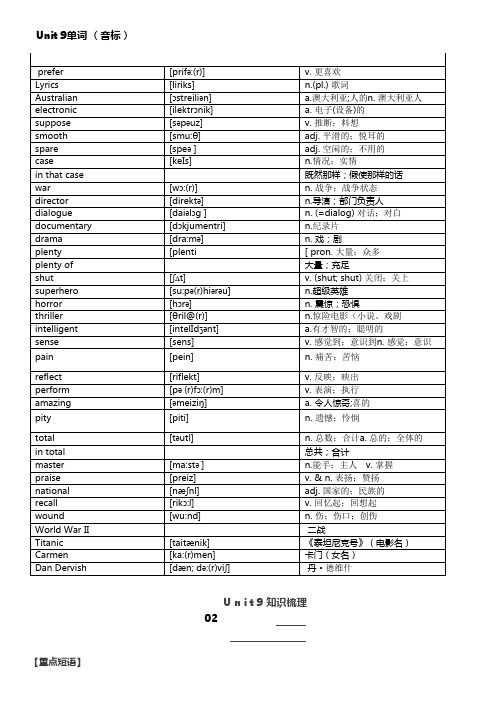
Unit 9单词(音标)U n i t 9 知识梳理02【重点短语】1.dance to (music) 随着(音乐)跳舞2.sing along with 随着…一起唱3.musicians who play different kinds of music弹奏不同类型音乐的音乐家4.electronic music 电子音乐5.not much 没什么(事)6.suppose sb to do sth. 猜想某人做某事7.be supposed to do sth 应该做某事8.suppose sb (to be) +adj. 原以为…9.have spare time 有空闲时间10.in one’s spare time在某人的空闲时间11.spare the time to do sth 抽时间做…12.a film director 一名电影导演13.think too much 想太多14.in that case 既然那样15.World War II 第二次世界大战16.smooth music 悦耳的音乐17.prefer A to B 比起B来更喜欢A18.prefer doing A to doing B19.prefer to do sth. rather than do sth.20.feel like doing sth 想要做某事21.stick to 坚持,固守22.be down 悲哀,沮丧23.cheer sb up 使… 高兴/ 振奋24.have a happy ending 有个美满的结局25.try one’s best to do sth. 尽某人最大努力做…26.less serious 不那么严重27.a good way to do sth 做某事的好办法28.make me feel even sadder 让我感觉更伤心29.provide plenty of information about a certain subject 提供了大量的关于某个主题的信息30.shut off my brain 关闭我的大脑【重点句型】1.I love singers who write their own music.我喜欢自己创作曲子的歌手。
人教版九年级英语Unit9单词、知识梳理,词汇句式精讲
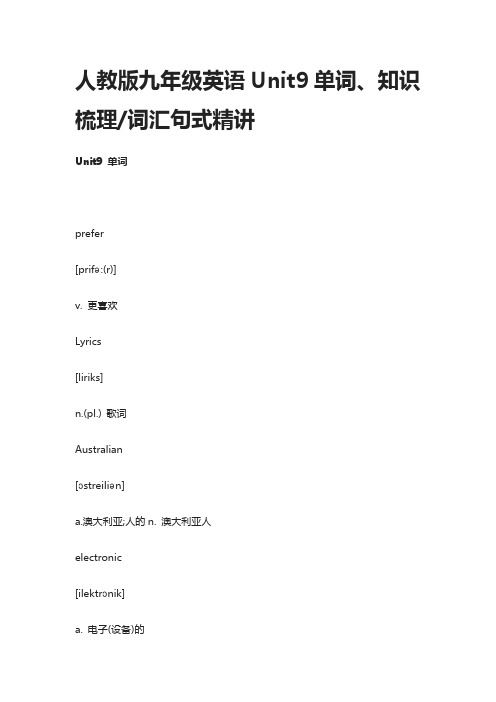
人教版九年级英语Unit9单词、知识梳理/词汇句式精讲Unit9 单词prefer[prifə:(r)]v. 更喜欢Lyrics[liriks]n.(pl.) 歌词Australian[ɔstreiliən]a.澳大利亚;人的n. 澳大利亚人electronic[ilektrɔnik]a. 电子(设备)的[səpəuz]v. 推断;料想smooth[smu:θ]adj. 平滑的;悦耳的spare[speə]adj. 空闲的;不用的case[keIs]n.情况;实情in that case既然那样;假使那样的话warn. 战争;战争状态director[direktə]n.导演;部门负责人dialogue[daiəlɔg ]n. (=dialog) 对话;对白documentary[dɔkjumentri]n.纪录片drama[dra:mə]n. 戏;剧plenty[plenti[ pron. 大量;众多plenty of大量;充足shut[ʃʌt]v. (shut; shut) 关闭;关上superhero[su:pə(r)hiərəu]n.超级英雄horror[hɔrə]n. 震惊;恐惧thriller[θril@(r)]n.惊险电影(小说、戏剧intelligent[intelIdʒənt]a.有才智的;聪明的sense[sens]v. 感觉到;意识到n. 感觉;意识pain[pein]n. 痛苦;苦恼reflect[riflekt]v. 反映;映出perform[pə(r)fɔ:(r)m]v. 表演;执行amazing[əmeiziŋ]a. 令人惊奇;喜的pity[piti]n. 遗憾;怜悯total[təutl]n. 总数;合计a. 总的;全体的in total总共;合计master[ma:stə]n.能手;主人v. 掌握praise[preiz]v. & n. 表扬;赞扬national[næʃnl]adj. 国家的;民族的recall[rikɔ:l]v. 回忆起;回想起wound[wu:nd]n. 伤;伤口;创伤World War II二战Titanic[taitænik]《泰坦尼克号》(电影名)Carmen[ka:(r)men]卡门(女名)Dan Dervish[dæn; də:(r)viʃ]丹•德维什Unit9 知识梳理【重点短语】1. dance to (music) 随着(音乐)跳舞2. sing along with 随着…一起唱3. musicians who play different kinds of music 弹奏不同类型音乐的音乐家4. electronic music 电子音乐5. not much 没什么(事)6. suppose sb to do sth. 猜想某人做某事7. be supposed to do sth 应该做某事8. suppose sb (to be) +adj. 原以为…9. have spare time 有空闲时间10. in one’s spare time在某人的空闲时间11. spare the time to do sth 抽时间做…12. a film director 一名电影导演13. think too much 想太多14. in that case 既然那样15. World War II 第二次世界大战16. smooth music 悦耳的音乐17. prefer A to B 比起B来更喜欢A18. prefer doing A to doing B19. prefer to do sth. rather than do sth.20. feel like doing sth 想要做某事21. stick to 坚持,固守22. be down 悲哀,沮丧23. cheer sb up 使…高兴/ 振奋24. have a happy ending 有个美满的结局25. try one’s best to do sth. 尽某人最大努力做…26. less serious 不那么严重27. a good way to do sth 做某事的好办法28. make me feel even sadder 让我感觉更伤心29. provide plenty of information about a certain subject 提供了大量的关于某个主题的信息30. shut off my brain 关闭我的大脑【重点句型】1. I love singers who write their own music.我喜欢自己创作曲子的歌手。
人教版英语九年级Unit9全单元知识点讲解

(2)kind of +adj.有点,有几分=a little+adj. (3) adj. 友好的
be kind to sb. = be good to sb.=be friendly to sb. 对某人友好
2. It's kind _ you _ help me with my English. A. of; to B. for; to C. of; for D. to; to
• suppose v.推断;料想;猜想
eg: I suppose I'll just listen to the new CD I bought.
Oh, in that case, I'll ask someone who likes serious movies. • war n.战争;战争状态
1. What is Sott going to do this weekend?
He will just listen to this new CD he bought.
He sticks to speaking English every day.
ex:— Don’t lose heart; ______and never give up. I’m sure you’ll succeed one day. — Thanks. I will try my best. A. stick learning B. go on to learn C. stick to learn D. stick to learning
Unit 9 单词讲解 -人教版九年级英语
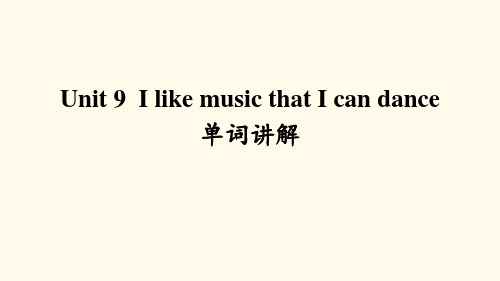
构成:
plenty
plenty of 大量;充足 (既可以 修饰可数名词,又可以修饰不可
[ˈplentɪ]
数名词,相当于lots of或 a lot of
),常用于肯定句中
pron. 大量;众多
例句:
In the summer,plenty of tourist
from all over the world come
down
[daʊn]
adj. 悲哀的;沮丧的 adv./prep.沿着
拓展:
let down 使...失望 put down 放下 cut down 砍倒 slow down 减缓;放慢 sit down 坐下 write down 写下 turn down 把声音调小
ending
[ˈendɪŋ]
case
[keɪs]
n. 情况;实情 ; 箱子
搭配: in case 后接从句;“以防;万一” in case of +单词“若某事发生;假如” in that case 既然那样;假使那样的话 in this case 在这种情况下 in any case 无论如何;不管怎样
例句: In that case, I won’t take that job.
pity
拓展: pity, shame “可惜
[ˈpɪti]
n. 遗憾;怜悯;
1.两者均可表示“遗憾的事”, 可以换用 2.shame还可以表示“可耻之事;
同情;可惜的事; 憾事
令人难堪的事”,指说话人对某
种行为感到厌烦,憎恶或讨厌; 而pity没有这一意思。 3.It is a pity that +从句 “真遗 憾......” What a pity! 真可以
九年级unit9知识点

九年级unit9知识点九年级Unit 9知识点作为九年级学生,Unit 9是我们学习中的一个重要环节。
在这个单元中,我们将学习许多新知识点,这些知识将对我们的学习和未来的发展起到重要的作用。
本文将对九年级Unit 9的知识点进行介绍和总结。
一、单词和词组在Unit 9中,我们将学习到许多新的单词和词组,这些词汇将丰富我们的词汇量,并有助于我们更好地理解和运用英语。
以下是本单元中的一些重要词汇:1. pollution - 污染2. environment - 环境3. recycling - 回收利用4. global warming - 全球变暖5. fossil fuels - 化石燃料6. renewable energy - 可再生能源除了上述单词外,我们还需要学习一些相关的词组,如:1. take action - 采取行动2. make a difference - 有所作为3. reduce carbon footprint - 减少碳足迹4. raise awareness - 提高意识5. conserve energy - 节约能源二、语法知识在Unit 9中,我们将学习到一些重要的语法知识,这些知识将帮助我们更好地构建句子,并准确地表达自己的想法。
以下是本单元中的一些重要语法知识点:1. 情态动词的用法:如can, could, may, might等,用于表示能力、请求、许可、推测等。
2. 定语从句的用法:用来修饰名词,并提供更多描述性的信息。
3. 间接引语:用于转述别人说过的话,并进行适当的调整。
值得注意的是,在使用上述语法结构时,我们要注意时态、语态和语气的正确运用,以便更加准确地表达自己的意思。
三、阅读和写作在Unit 9中,我们将有机会进行一些阅读和写作练习,以提高我们的阅读理解和写作能力。
在进行阅读练习时,我们应该注重理解文章的主旨、细节和推理能力。
此外,在写作方面,我们将学习如何写一篇关于环保的短文或文章,以及如何论述自己的观点并提供支持性的证据。
2020年中考英语人教版九年级全册unit9单词讲解
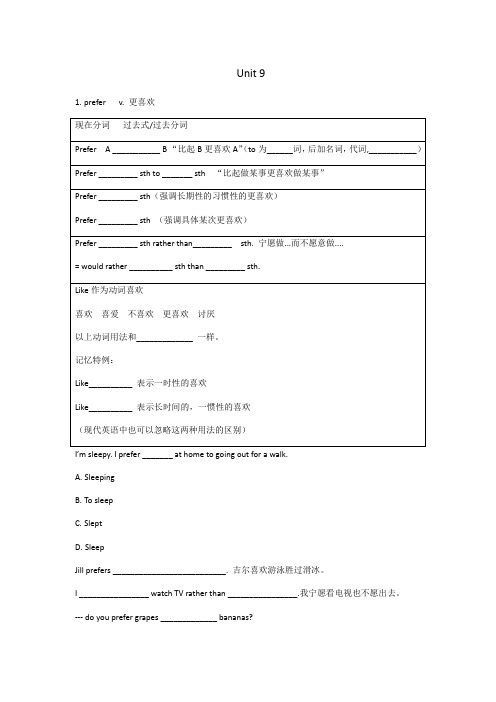
Unit 91.prefer v. 更喜欢I’m sleepy. I prefer _______ at home to going out for a walk.A.SleepingB.To sleepC.SleptD.SleepJill prefers __________________________. 吉尔喜欢游泳胜过滑冰。
I ________________ watch TV rather than ________________.我宁愿看电视也不愿出去。
--- do you prefer grapes _____________ bananas?--- i prefer grapes ____________ bananas.A.To ; orB.Or ; toC.Than ; to--- i prefer sports shows ____________ soap operas. What about you?---me ,too.A.ToB.ThanC.AtMany old men prefer ____________ in a peaceful countryside.A.To liveB.LivingC.LiveD.Lived2.lyrics n. (pl.) 歌词;抒情诗This _____________ sings _____________. 这首抒情诗唱起来很好听。
3.Australian adj. 澳大利亚的;澳大利亚人的n. 澳大利亚人4.electronic adj. 电子的;电子设备的I like ____________________ books on ______________. 我喜欢读一些关于电子音乐的书。
5.suppose v. 推断;料想You __________________ your papers before class is over. 希望你下课前交卷子。
人教版九年级上册英语unit9知识要点汇总
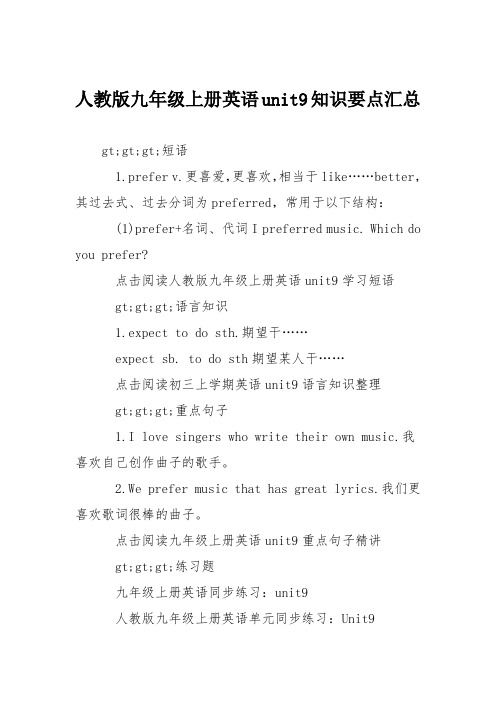
人教版九年级上册英语unit9知识要点汇总
gt;gt;gt;短语
1.prefer v.更喜爱,更喜欢,相当于like……better,其过去式、过去分词为preferred,常用于以下结构:
(1)prefer+名词、代词I preferred music. Which do you prefer?
点击阅读人教版九年级上册英语unit9学习短语 gt;gt;gt;语言知识
1.expect to do sth.期望干……
expect sb. to do sth期望某人干……
点击阅读初三上学期英语unit9语言知识整理 gt;gt;gt;重点句子
1.I love singers who write their own music.我喜欢自己创作曲子的歌手。
2.We prefer music that has great lyrics.我们更喜欢歌词很棒的曲子。
点击阅读九年级上册英语unit9重点句子精讲 gt;gt;gt;练习题
九年级上册英语同步练习:unit9
人教版九年级上册英语单元同步练习:Unit9
总结各课时的知识点是为了帮助大家更好的记忆和复习,为大家实时更新九年级上册英语unit9知识要点,请大家持续关注呦!!。
人教版英语九年级词汇精讲——Unit9

Unit9 I like music that I can dance to .1.prefer v. 更喜欢;偏爱prefer sth 更喜欢某物prefer A to B 比起B更喜欢Aprefer doing sth1 to doing sth 2 比起做B更喜欢做Aprefer to do/doing sth 更喜欢做某事=like doing sth betterprefer to do sth1 rather than do sth2 宁愿做1,不愿意做2 =would rather do sth1 than do sth2 preference n. 偏爱;优先权;偏爱的事务e.g. Now more and more people also share that preference. 现在,越来越多的人也有同样的偏好。
2.Australian adj. 澳大利亚(人)的n. 澳大利亚人Australia n. 澳大利亚其他常见的国家和国人:3.electronic adj. 电子的;电子设备electronics n. 电子学;电子设备electronical adj. 电子的electricity n. 电;强烈的感情4.suppose v. 假定;假设;推断①suppose +sb/sth+to be 认为某人/某物是...②suppose+that从句表示猜测,假定③be supposed to do sth = should do sth = be expected to do sth 应该/理应做某事be not supposed to do sth 不允许或禁止做某事5.smooth adj. 悦耳的;平滑的e.g. We could feel the smooth texture of silk. 我们能感觉出丝绸的光滑质地。
smoothly adv. 顺利地同义词辨析: “平的;平坦的”v. 使光滑;清除(困难,障碍等)smooth away 清除掉...6.spare adj. 空闲的;不用的;多余的spare time 空余时间= free timev. 抽出;留出e.g. Every family in our village has grain to spare. 我们村家家有余粮。
【人教版】九年级英语课文单词知识点精讲第九单元ppt
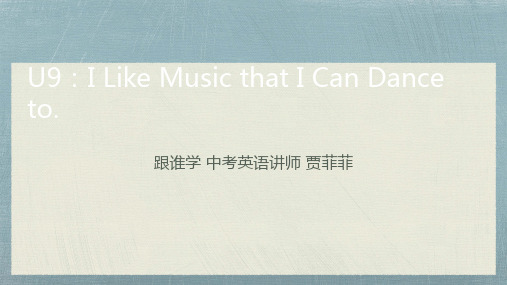
lifetime n. 一生;有生之年 He won a lot of prizes in his lifetime.
pity n. 遗憾;怜悯 It's a pity that most of us die too soon.
director n. 导演;部门负责人 He is the director of the show.
case n. 情况;实情 It’s a classic case of bad planning.
in that case 既然那样;假使那样的话 —I’ve made up my mind.—In that case, there’s no point discussing it.
I have a friend (who/whom/that) everybody likes.
The basketball (which/that) my uncle gave me is great.
end of this weekend. in the end 最终 In the end, the prince married the princess.
语法
定语从句 定语修饰名词,定语从句放在名词之后。 前置定语:a cute dog 后置定语:a dog called Lucky 定语从句:I have a dog which is called Lucky.
sadness n. 悲伤;悲痛 I felt a deep sadness.
pain n. 痛苦;苦恼 She was clearly in a lot of pain.
英语单词拆分趣味快速记忆课件ppt人教版九年级全册 Unit9

stick to 坚持;固守
down [daʊn] adj. 悲哀;沮丧 分析:do-做、wn-蜗牛 记忆方法:做蜗牛太悲哀了。
dialog ['daɪəlɒg] ['daɪəlɑ:g] n. (=dialogue) 对话;对白 分析:di-弟、a-苹果、lo-象形数字“10”、g-鸽
记忆方法:弟弟吃着苹果和10个鸽子练对白。
记忆方法:做醋的门徒给一条人鱼拍纪录片。
drama ['drɑ:mə]
n. 戏;剧
分析:dra-点燃、ma-妈 记忆方法:戏剧点燃妈妈的热情。
plenty [ˈplenti] pron.大量;众多 分析:p-皮鞋、le-乐、nt-泥土、y-弹弓 记忆方法:皮鞋快乐地在泥土上玩大量的弹弓。
plenty of 大量;充足
suppose [sə'pəʊz]
v. 推断;料想
分析:s-蛇、up-向上、pose-姿势 记忆方法:料想一条蛇向上摆姿势。
smooth [smu:ð ] adj. 悦耳的;光滑的 分析:sm-上面、oo-望远镜、th-土豪 记忆方法:上面的望远镜在土豪光滑的头上。
spare [speə] [sper] adj. 空闲的;不用的 v. 抽出;留出 分析:sp-薯片、are-是
moving ['mu:vɪŋ]
adj. 动人的;令人感动的
分析:mo-模、vi-6、ng-南瓜 记忆方法:模特收到6个南瓜,真令人感动。
perform [pɚ(r)'fɔ:(r)m]
v. 表演;执行
分析:pe-胖鹅、r-草、for-为了、m-汉堡包 记忆方法:胖鹅表演小草是为了得到汉堡包。
lifetime ['laɪftaɪm]
人教版九年级英语Unit 9知识点总结

九年级英语Unit 9 I like music that I can dance to 讲义一、词性转换Section A 5.documentary→(n.)8.pain → (adj.) painful1.Australian → (n.) Australia2.director → (v .) direct3.smooth → (v.) smoothen4.ending → (n.) enddocument9.moving → (v.) move6.intelligent – (n.) intelligenceSection B10.perform → (n.) performance11.popular → (n.) popularity 7.sadness → (adj.) sad二、短语归纳1.sing along with 跟着一起唱2.dance to 随着跳18.scary movie 恐怖电影19.shut off 关闭,停止运转20.save the world 拯救世界21.just in time 及时了很严重的病37.become blind 变成盲人38.live on the street 住在街上39.play on the street 在街上表演3.different kinds of 不同类型的4. a long week at … 一周长时间的……22.once in a while 偶尔地,间或40.in this way 以这种方式41.musical skills 音乐技能42.during one’s lifetime 在某人的一生中5.spare time 空闲时间6.in that case 既然那样7.stick to 坚持,固守8.depend on 取决于9.be down 失落23.do sth alone 独自做某事24.bring a friend 带上一个朋友25.be afraid of sth 怕……26.feel scary 感到害怕/恐怖27.each kind of 每种43.in total 总共,总计44.for this reason 由于这个原因10.cheer sb. up 使某人振作起来28.write one’s own lyrics 自己写词45.painful experiences 痛苦的经历11.a happy ending 美满的结局12.try one’s best 尽最大努力13.solve one’s problems 解决某人的问题29.musical instruments 乐器30.a piece of music 一首乐曲31.folk music 民俗音乐32.cry along with 随着哭33.look up 查阅,抬头看34.teach sb. to do sth. 教某人做某事46.touch the heart(s) of sb. 打动人心47.pain and wounds 痛苦和创伤14.a goo way to do sth 一种……好方法48.praise sb. as 称赞某人为15.plenty of 大量,充足16.a certain subject 某个主题17.action movie 动作片35.grow worse 变得更糟36.develop a serious illness 得1.I suppose… 我想…… 4.not do sth anymore 不在做某事2.feel like doing 想做某事3.too + adj. + to do 太……而不……5.It is a pity that… 遗憾的是……6.…is a time for… ……是一个……的时间三.重点句子1.I prefer music that has great lyrics. 我更喜欢有好歌词的音乐。
人教英语九年级 知识点精讲Unit 9

人教英语九年级知识点精讲Unit 9 I like music that I can dance to.Section A(1a- 2d)一、词语精讲1. prefer的用法作动词,意为“更喜欢,宁愿”,后接动词时,可用不定式或动名词。
具体用法如下:(1) prefer + 名词I much prefer jazz to rock music.我喜欢爵士乐远胜过摇滚乐。
(2) prefer +名词+ 形容词I prefer my coffee black.我喜欢不加奶的咖啡。
(3) prefer + 动词不定式I prefer not to think about it.我不想考虑此事。
(4) prefer + 动名词短语I prefer playing football.我喜欢踢足球。
(6) prefer + that从句I would prefer that you did not mention my name.我希望你不要说出我的名字。
2. suppose的用法suppose作动词,意为“(根据所知)推断,料想”,常用于虚拟语气。
如:I suppose you could give a talk instead. 我料想你可以代作个报告。
拓展:(1)当主语为第一人称且后接否定的宾语从句时,通常将否定前置。
如:I don’t suppose you need to worry. 我看你不必着急。
(2)be supposed to (do)意为“应该”。
如:Friends are not supposed to hurt each other. 朋友不应该互相伤害。
3. spare的用法(1)作形容词,意为“空闲的”,常用来修饰时间。
如:He’s studying music in his spare time.他在空闲时间学音乐。
(2)作形容词,意为“不用的,闲置的”。
如:We've got a spare bedroom, if you'd like to stay.如果你愿意住下,我们有一间不用的卧室。
人教版英语九年级Unit9单元知识点归纳

人教版英语九年级Unit9单元知识点归纳Unit 9: Describing PeopleIn Unit 9, we have learned various vocabulary and grammar structures related to describing people. This unit is important for building our English language skills and expanding our ability to communicate effectively about appearances and personalities. In this article, we will summarize the key points and takeaways from Unit 9 of the People's Education Edition's 9th-grade English curriculum.1. Physical Appearance- We learned words to describe physical appearance such as tall, short, thin, and overweight.- Adjectives like beautiful, handsome, and attractive were introduced to describe people's appearances.- Vocabulary related to different facial features, hairstyles, and clothing styles were covered.2. Personality Traits- Unit 9 provided us with a wide range of vocabulary to describe personality traits, including adjectives like friendly, outgoing, shy, and confident.- We also learned words to describe someone's behavior, such as kind, helpful, and supportive.- Understanding and using these vocabulary words will enable us to accurately describe others' personalities in conversations and discussions.3. Comparing and Contrasting- In Unit 9, we learned comparative and superlative forms of adjectives to compare people's appearances and personalities.- By using structures like "as...as," "more...than," and "the most/the least," we can express similarities and differences between individuals.4. Asking and Answering Questions- The unit taught us useful questions and responses to inquire about someone's appearance and personality.- Question forms like "What does he/she look like?" and "What ishe/she like?" were introduced.- We also practiced forming complete responses to accurately describe people based on the information given.5. Writing Descriptions- Throughout Unit 9, we practiced writing descriptive paragraphs about people.- The paragraphs included details about appearance, personality, and any other relevant information.- We learned to organize our thoughts and use appropriate vocabulary and grammar structures to effectively convey our descriptions.6. Role Plays and Activities- Unit 9 included various role-plays and activities to engage us in practicing the new vocabulary and structures.- These activities aimed to provide real-life situations where we could apply what we learned.- By participating in these activities, we gained confidence in describing people in English.In conclusion, Unit 9 of the 9th-grade People's Education Edition English curriculum focused on teaching us how to describe people effectively. We learned new vocabulary related to physical appearance and personality traits and practiced using them in conversations and written descriptions. By studying this unit, we have enhanced our ability to describe others accurately and expanded our overall language skills.。
人教版英语九年级上册Unit9知识点详解
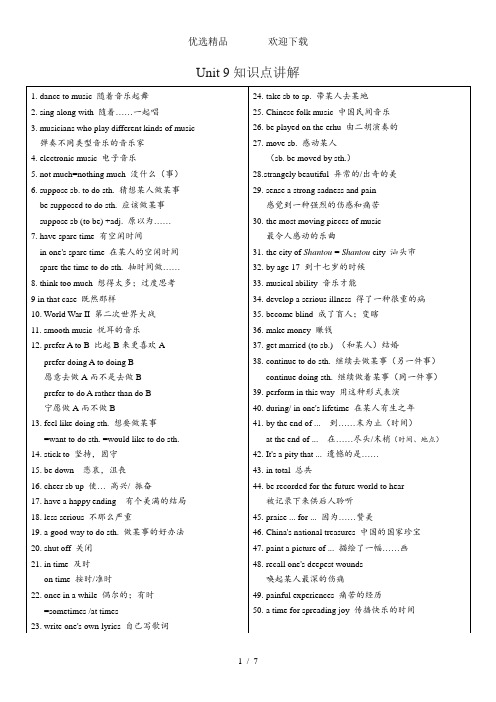
Unit 9知识点讲解1. dance to music 随着音乐起舞2. sing along with 随着……一起唱3. musicians who play different kinds of music弹奏不同类型音乐的音乐家4. electronic music 电子音乐5. not much=nothing much 没什么(事)6. suppose sb. to do sth. 猜想某人做某事be supposed to do sth. 应该做某事suppose sb (to be) +adj. 原以为……7. have spare time 有空闲时间in one's spare time 在某人的空闲时间spare the time to do sth. 抽时间做……8. think too much 想得太多;过度思考9 in that case 既然那样10. World War II 第二次世界大战11. smooth music 悦耳的音乐12. prefer A to B 比起B来更喜欢Aprefer doing A to doing B愿意去做A而不是去做Bprefer to do A rather than do B宁愿做A而不做B13. feel like doing sth. 想要做某事=want to do sth. =would like to do sth.14. stick to 坚持,固守15. be down 悲哀,沮丧16. cheer sb up 使… 高兴/ 振奋17. have a happy ending 有个美满的结局18. less serious 不那么严重19. a good way to do sth. 做某事的好办法20. shut off 关闭21. in time 及时on time 按时/准时22. once in a while 偶尔的;有时=sometimes /at times23. write one's own lyrics 自己写歌词24. take sb to sp. 带某人去某地25. Chinese folk music 中国民间音乐26. be played on the erhu 由二胡演奏的27. move sb. 感动某人(sb. be moved by sth.)28.strangely beautiful 异常的/出奇的美29. sense a strong sadness and pain感觉到一种强烈的伤感和痛苦30. the most moving pieces of music最令人感动的乐曲31. the city of Shantou = Shantou city 汕头市32. by age 17 到十七岁的时候33. musical ability 音乐才能34. develop a serious illness 得了一种很重的病35. become blind 成了盲人;变瞎36. make money 赚钱37. get married (to sb.) (和某人)结婚38. continue to do sth. 继续去做某事(另一件事)continue doing sth. 继续做着某事(同一件事)39. perform in this way 用这种形式表演40. during/ in one's lifetime 在某人有生之年41. by the end of ... 到……末为止(时间)at the end of ... 在……尽头/末梢(时间、地点)42. It's a pity that ... 遗憾的是……43. in total 总共44. be recorded for the future world to hear被记录下来供后人聆听45. praise ... for ... 因为……赞美46. China's national treasures 中国的国家珍宝47. paint a picture of ... 描绘了一幅……画48. recall one's deepest wounds唤起某人最深的伤痛49. painful experiences 痛苦的经历50. a time for spreading joy 传播快乐的时间知识点梳理1. Hmm, depends which movie.嗯,那要看是哪部电影了。
人教版九年级英语unt9知识点
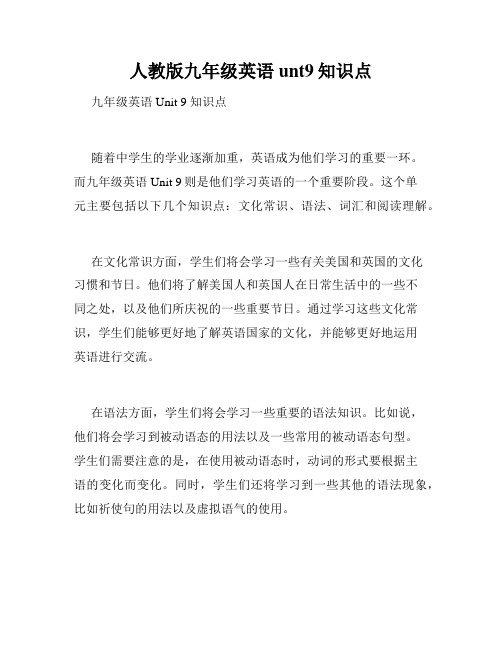
人教版九年级英语unt9知识点九年级英语Unit 9 知识点随着中学生的学业逐渐加重,英语成为他们学习的重要一环。
而九年级英语Unit 9则是他们学习英语的一个重要阶段。
这个单元主要包括以下几个知识点:文化常识、语法、词汇和阅读理解。
在文化常识方面,学生们将会学习一些有关美国和英国的文化习惯和节日。
他们将了解美国人和英国人在日常生活中的一些不同之处,以及他们所庆祝的一些重要节日。
通过学习这些文化常识,学生们能够更好地了解英语国家的文化,并能够更好地运用英语进行交流。
在语法方面,学生们将会学习一些重要的语法知识。
比如说,他们将会学习到被动语态的用法以及一些常用的被动语态句型。
学生们需要注意的是,在使用被动语态时,动词的形式要根据主语的变化而变化。
同时,学生们还将学习到一些其他的语法现象,比如祈使句的用法以及虚拟语气的使用。
词汇是语言的基础,所以在学习英语时,词汇的积累也是非常重要的。
在Unit 9中,学生们将学习一些和科技、生态环保以及社会问题相关的词汇。
例如,他们将学习到一些关于电脑和互联网的词汇,以及一些与环境保护相关的词汇。
学生们需要通过多读多背来巩固这些词汇,以便在实际运用中能够熟练地使用它们。
阅读理解是学生们运用英语进行阅读和理解的能力。
在Unit 9中,学生们将通过阅读一些有关科技、环保以及社会问题的文章来提高他们的阅读理解能力。
他们将学习到如何通过阅读来获取信息,如何通过上下文推断词义,以及如何进行判断和概括。
通过这些阅读练习,学生们能够更好地理解所学的知识,并且能够在实际生活中运用这些知识。
总结起来,九年级英语Unit 9主要包括文化常识、语法、词汇和阅读理解这几个方面的知识点。
通过学习这些知识点,学生们能够更好地了解英语国家的文化,提高语法运用能力,丰富词汇量,并提高阅读理解能力。
这些都为他们的英语学习打下了坚实的基础,也为他们将来更深入地学习英语提供了良好的条件。
因此,九年级英语Unit 9的学习对于中学生来说是非常重要的。
人教版九年级英语Unit9知识点梳理及语法讲义(教师版)
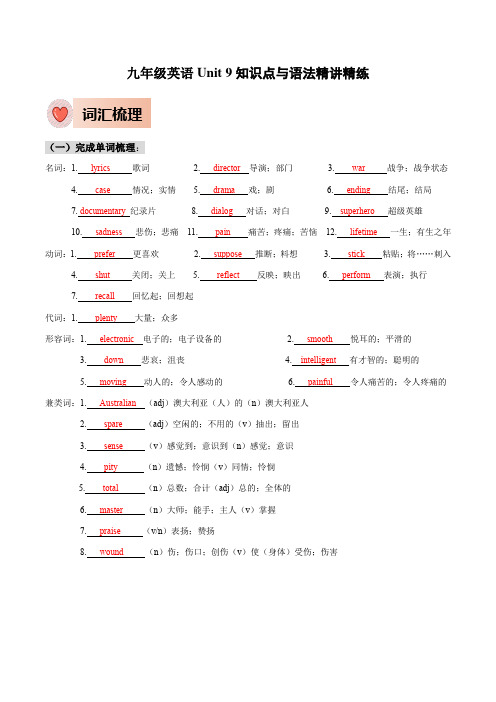
九年级英语Unit 9知识点与语法精讲精练词汇梳理(一)完成单词梳理:名词:1. lyrics歌词 2. director 导演;部门 3. war 战争;战争状态4. case 情况;实情5. drama 戏;剧6. ending 结尾;结局7. documentary 纪录片8. dialog 对话;对白9. superhero 超级英雄10. sadness 悲伤;悲痛11. pain 痛苦;疼痛;苦恼12. lifetime 一生;有生之年动词:1. prefer 更喜欢 2. suppose 推断;料想 3. stick 粘贴;将……刺入4. shut 关闭;关上5. reflect 反映;映出6. perform 表演;执行7. recall 回忆起;回想起代词:1. plenty 大量;众多形容词:1. electronic 电子的;电子设备的 2. smooth 悦耳的;平滑的3. down 悲哀;沮丧4. intelligent 有才智的;聪明的5. moving 动人的;令人感动的6. painful 令人痛苦的;令人疼痛的兼类词:1. Australian (adj)澳大利亚(人)的(n)澳大利亚人2. spare (adj)空闲的;不用的(v)抽出;留出3. sense (v)感觉到;意识到(n)感觉;意识4. pity (n)遗憾;怜悯(v)同情;怜悯5. total (n)总数;合计(adj)总的;全体的6. master (n)大师;能手;主人(v)掌握7. praise (v/n)表扬;赞扬8. wound (n)伤;伤口;创伤(v)使(身体)受伤;伤害(二) 词汇变形小结:1. Australia (n. 澳大利亚) — Australian (adj/n澳大利亚的)2. electronic(adj. 电子的) — electricity (n. 电;电能)3. smooth (adj. 平滑的) — smoothly (adv. 平稳地;平滑地)4. direct (v. 指导) — director (n. 导演;部门负责人)5. stick (v. 粘贴;将……刺入)— stuck (过去式) — stuck (过去分词)6. end (v. 结束) — ending (n. 结尾;结局)7. shut(v. 关闭;关上) — shut (过去式) — shut (过去分词)8. intelligent(adj. 有才智的;聪明的) — intelligence (n. 智力;才智)9. sadness(n. 悲伤) — sad (adj. 悲哀的;难过的) — sadly (adv. 伤心地)10. pain(n. 疼痛) — painful (adj. 令人痛苦的;令人疼痛的)11. reflect(v. 反映;映出) — reflection (n. 映像;反映)12. move(v. 使感动;打动) — moving (adj. 动人的;令人感动的) — moved (adj. 感动的)13. perform(v. 表演) — performance (n. 演出) — performer (n. 表演者)14. total(adj. 总的;总体的) — totally (adv. 全部地)【练一练】用所给词的适当形式填空1.You must be active to share your happiness and ___sadness_____with others.(sad)2.The spaceship traveled ___smoothly____ (smooth) in the universe.3.Xuzheng is not only an actor,but also a successful ___director____ (direct).4.Going to the dentist is a ___painful_____(pain) experience for most people.5.Lily, an ___Australian____(Australia) girl, came to China three years ago.st night, my mother told me a ____moving_____(move) story.7.I like stories which have happy___endings______(end).8.___Electronic___(electricity) products are now widely used all over the world.9.There is no general agreement on standard definition(定义)of ___intelligence___ (intelligent).10.He often plays soccer with his friends instead of ___playing_______ (play) puter games at home.(三) 短语攻关: in that case 既然那样;假使那样的话 stick to 坚持;固守 plenty of大量;充足 shut off 关闭;停止运转 once in a while偶尔地;间或 in total 总共;合计 dance to 随着……跳舞 electronic music 电子音乐sing along with 跟着……一起唱 depend on 由……决定;取决于 in time及时 spare time 空闲时间 in this way用这种方式 think about 思考;考虑1.I prefer music that has great lyrics. 我更喜欢歌词优美的音乐。
新人教版九年级英语unit9单词讲解
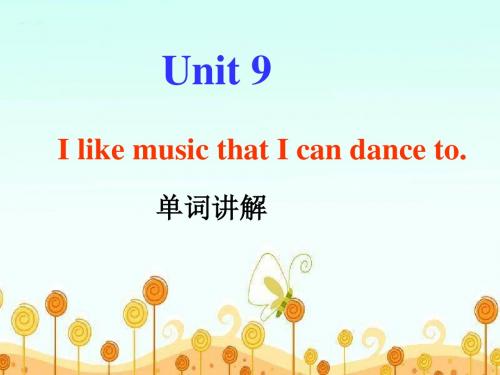
I like music that I can dance to.
单词讲解
Section A -- Words
1.prefer
to choose sth because you like it better. v. 更喜欢 like sth better
prefer– prefers-- preferring--preferred
All students prefer to take the bus rather than walk. = All students prefer taking the bus to walking. =All students would rather take the bus than walk.
prefer + that 从句(should +do ,should 可省) prefer to do sth. rather than do sth.
比起B来更喜欢A 喜欢A而不喜欢B 宁愿做A而不愿做B 更喜欢做某事
更喜欢… 喜欢做…而不喜欢做… 宁愿做…而不愿做…
prefer to do sth rather than do sth = prefer doing sth to (doing) sth = would rather do sth than do sth
A 3. Some of my classmates _______ cartoons _______ documentaries. A. prefer ... to B. would rather ... than C. like ... better D. like ... less A 4. She prefers to eat outside rather than ____ at home. A. cook B. cooking C. to cook D. cooks
- 1、下载文档前请自行甄别文档内容的完整性,平台不提供额外的编辑、内容补充、找答案等附加服务。
- 2、"仅部分预览"的文档,不可在线预览部分如存在完整性等问题,可反馈申请退款(可完整预览的文档不适用该条件!)。
- 3、如文档侵犯您的权益,请联系客服反馈,我们会尽快为您处理(人工客服工作时间:9:00-18:30)。
Which one do you like better, bananas or oranges?
I nanas!
prefer sth
I prefer bananas to oranges!
prefer A to B
exercises
更喜欢某物
宁愿做某事(强调特定 情况或具体动作)
比起B来更喜欢A 喜欢A而不喜欢B 宁愿做A而不愿做B
prefer doing
更喜欢做某事
prefer + that 从句(should 更喜欢… +do ,should 可省)
prefer to do sth. rather than 喜欢做…而不喜欢做…
水平如镜。 3) The surface of the ice is so smooth. smoothly adv. 平稳地,平静地
7. spare adj. 空闲的,不用的 v. 抽出,留出
in one’s spare time = in one’s free time 在某人的空闲时间 eg. 1) What do you do in your spare time?
Verb
prefer doing sth prefer to do sth
Prefer doing sth to doing sth
prefer sth.= like sth. better prefer to do sth. prefer A to B
prefer doing A to doing B
= All students prefer taking the bus to walking.
=All students would rather take the bus than walk.
1. Not all the tourists from Japan
__B_____ Western food to Chinese food.
Unit 9
I like music that I can dance to.
单词讲解
Section A -- Words
1.prefer
to choose sth because you like it better. v. 更喜欢 like sth better
prefer– prefers-- preferring--preferred
A. like B. prefer C. enjoy D. love
2. I prefer skiing to ___B____. The snow
makes me excited. A. cycles B. cycling C. cycled
3. Some of my classmates __A_____ cartoons
He prefers swimming. He prefers to swim.
VS
I prefer playing basketball to playing football!
prefer doing sth to doing sth
prefer
prefer sth
Noun Prefer sth to sth
我更喜欢咖啡
I prefer coffee.
比起糖果,我更喜欢水果
I prefer fruits to candies.
prefer doing sth 更喜欢做某事 prefer to do sth 宁愿做某事,
强调特定情况或具体动 作I prefer walking.
I prefer to walk.
= should do sth.
eg. I am supposed to leave now.
suppose + n./sb + (to be ) + adj. 原以为… She had supposed him (to be ) very rich.
6. smooth adj. 悦耳的,平滑的
1) The girl likes smooth music. 2)The water was as smooth as glass.
_______ documentaries. A. prefer ... to B. would rather ... than C. like ... better D. like ... less
4. She prefers to eat outside rather than _A___
at home. A. cook B. cooking C. to cook D. cooks
2) You can stay with us tonight. We have a spare room. spare sb sth = spare sth for sb 把某物分给某 人
electronic music
5. suppose v. 推断,料想 suppose sb to do sth. suppose + 从句
eg. 1.They suppose him to know the truth.
2. --Where is Jenny? -- I don’t know. I suppose she is still at work. be supposed to do sth. 应该做某事
2. lyrics n. 歌词 I prefer music that has great lyrics.
3. Australian n. 澳大利亚人 adj. 澳大利亚(人)的
他是一位澳大利亚的男孩。
He is an Australian boy.
4. electronic adj. 电子的,电子设备的 electricity n. 电,电能 电子音乐
do sth.
宁愿做…而不愿做…
prefer to do sth rather than do sth = prefer doing sth to (doing) sth = would rather do sth than do sth
All students prefer to take the bus rather than walk.
